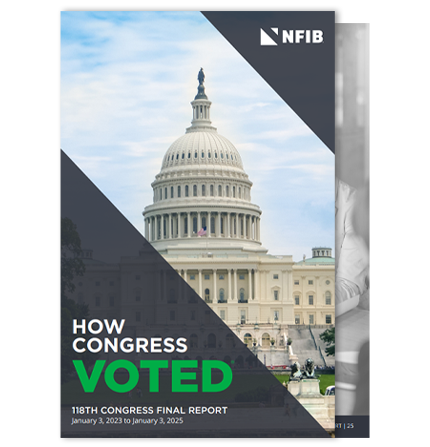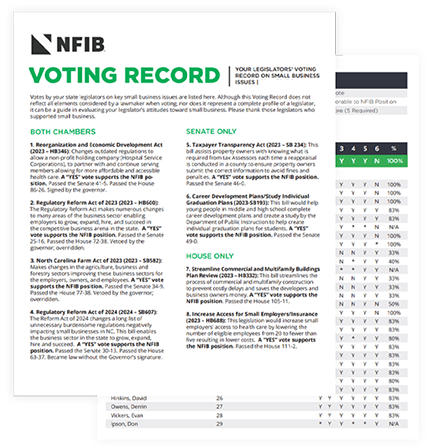NFIB holds members of Congress accountable for the way they vote on key small business issues by notifying them of designated Key Votes and tracking whether each legislator votes with America’s small businesses. This information is regularly published in NFIB’s How Congress Voted reports as a clear record of legislators’ votes on small business issues. See how your lawmaker is voting in the current 118th Congress scorecard.

How Congress Voted

Congress Report and Scorecard

Voting Record in
NFIB tracks the key legislative issues identified by our small business members every session and then we tabulate a score for each New York lawmaker in the state House and state Senate. The NFIB voting record provides a critically important evaluation of a legislator’s attitude toward small business based on floor votes. You won’t find a more effective way to gauge the performance of politicians than examining their voting record.
While most elected officials claim to support small businesses, the NFIB voting record gives business owners and other citizens a picture of what your state representatives and state senators are up to in New York City. Please thank those legislators who supported small business and continue to work with those who have fallen short.
View PDFKey Votes
U.S. House Key Votes for the 118th Congress
-
Family and Small Business Taxpayer Protection Act (H.R. 23)
-
CRA Resolution of Disapproval for the Waters of the United States (WOTUS) Final Rule (H.J.Res.27)
-
The Lower Energy Costs Act (H.R. 1)
-
The CHOICE Arrangement Act (H.R. 3799)
-
S.J. Res. 32, providing for congressional disapproval under chapter 8 of title 5, United States Code, of the rule submitted by the Bureau of Consumer Financial Protection relating to “Small Business Lending Under the Equal Credit Opportunity Act (Regulation B)
-
H.R. 5378, the Lower Costs More Transparency Act
-
H.J.Res. 98, Joint Employer CRA
How members shape NFIB positions
Each member has a say with their wallet
Twice each year, approximately 300,000 NFIB members are asked to vote on timely small business policies, answering questions about their positions on small business legislative and regulatory issues. Our business owners’ responses to ballot questions are what guides NFIB’s policy positions at a state and federal level.
NFIB designates Key Votes and asks legislators to support
Our policy positions and priorities are determined by member ballots. Based on this input, NFIB designates Key Votes in the U.S. Congress and asks legislators to support these consensus views of small business owners. During this process, members of Congress are reminded that their votes will be monitored and reported to NFIB members.
We report to you how Congress voted
NFIB tracks whether each legislator votes with America’s small businesses. This information is regularly published in NFIB’s “How Congress Voted” reports for our members and serves as a clear record of legislators’ votes on key issues.
Guardians of Small Business Award
Legislators who stood by small business on Key Votes 70 percent or more of the time earn Guardian of Small Business Award. We urge you to check if your lawmaker made the list.
Join Today And Make Sure Your Business Is Heard
Join Today And Make Sure Your Business Is Heard
Our “One Member, One Vote” policy ensures that each and every member has an equal say in the policy positions NFIB takes. You’ll also enjoy access to valuable resources and to money-saving deals that can help your business succeed.








